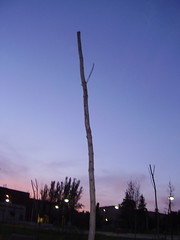detectives with cliolators
(sorry this is late)
Cohen and Rosenzweig argue that a rapidly approaching fact-checking gadget that they (ingeniously) call the cliolator will soon be to history as the calculator was to math. After our discussion in class today regarding the difference between learning history and "doing" history, I'm still not sure what to make of the idea of the cliolator. Cohen and Rosenzweig use their example primarily with dates. But even dates are not numbers the way that they are in an equation. There are an infinite number of "facts" in the world. Historical "facts" such as dates are created by the people who single them out as significant. Events become historical facts only after they have been afforded some attention, and with attention come all sorts of arguments about why they are significant.
Dates themselves are embedded in certain historiographical arguments, or in popular narratives. What does this mean for students? Will having a fact-checking device make them more or less critical about pre-sorted information? Would it be like having an open-notebook test, which forces you to only single out information that is relevant to an argument, rather than try to impress your teachers with your ability to retain information?
My other concern is the murky line between understanding historiography and "doing" history. To use an analogy from English Departments: are students in a literature class, in which they read and study texts, learn how they are constructed and also the content, or are they in the creative writing class, in which they are taught how to construct those texts themselves? Anyone who has sat down with fifty different newspaper articles regarding one event can attest to how bewildering it can be to simply figure out what happened. A website like Who Killed William Robinson opens up the excitement of history (the detective work) to students who might otherwise never quite understand how every history book is doing exactly that (drawing on evidence to make more--or less--plausible arguments) on a larger scale.
It's interesting that both having instant access to historical "facts" and being able to immerse yourself in primary documents to make sense of an event on your own have the effect of displacing historiography. While very exciting, it makes it far too easy to get lost in all the disparate information.


0 Comments:
Post a Comment
<< Home